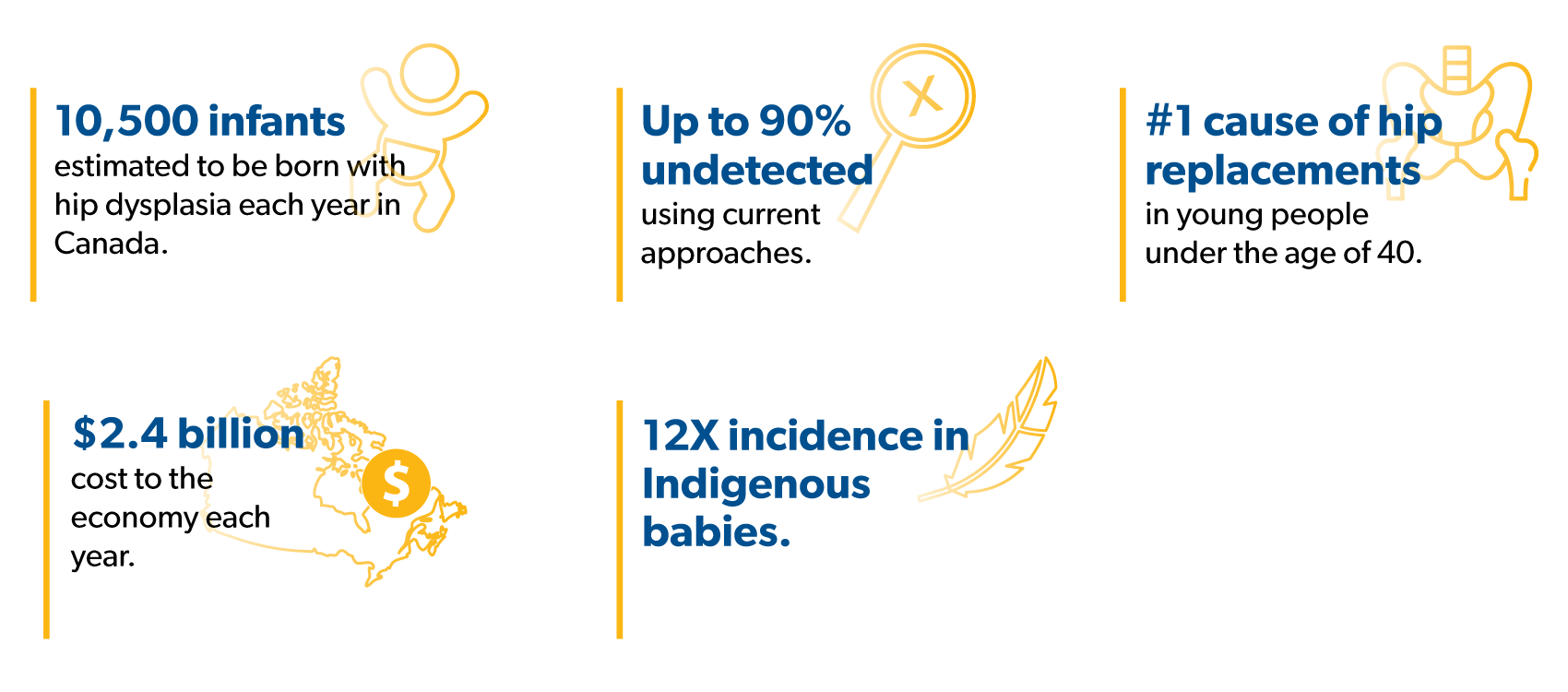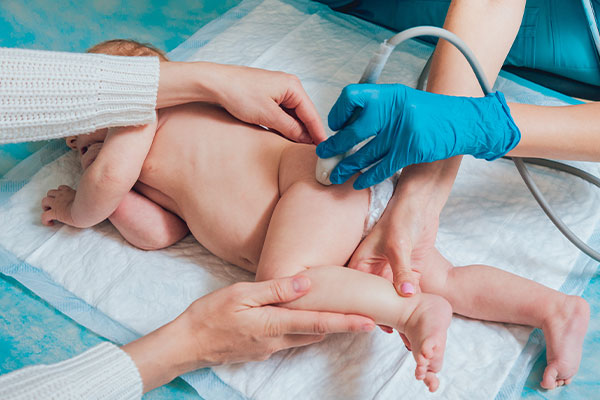Developmental dysplasia of the hip, or hip dysplasia, occurs when the hip socket fails to form properly. Every year, 10,500 infants in Canada are born with it, or 25 per day. It is 12 times more likely to occur in Indigenous babies, and 4 to 9 times more likely to occur in females than males. When left undetected, hip dysplasia often leads to severe osteoarthritis, resulting in chronic pain, costly surgeries, and a diminished quality of life.

Stopping arthritis pain before it begins
Imagine a world where every baby has equitable access to an early diagnosis and treatment — a world where we catch hip dysplasia before symptoms appear. In this world, we don’t just treat hip dysplasia — we spare countless children from unbearable pain, future costly surgeries, and the struggle to keep up with their peers.
With investment in research and innovation, this is the future we are striving to create — a future where pain is stopped before it begins, and every child’s first steps are a celebration of health, not a sign of what might go wrong. We are on the brink of a new reality, where the next generation can grow up with the freedom to move, play and explore without the shadow of hip dysplasia holding them back.
The Newborn Arthritis Prevention Screening (NAPS) Project, led by Arthritis Society Canada and Dr. Jacob Jaremko, MD, PhD, pediatric musculoskeletal radiologist at the University of Alberta, is trailblazing in the field of Developmental Dysplasia of the Hip diagnosis — detecting it in babies within seconds.

Partnering with the University of Alberta
“The partnership between the University of Alberta and Arthritis Society Canada is profoundly impactful to the diverse communities we serve and the research we conduct across our campuses. Aligning with U of A key priorities as well as reflecting the commitments and strategies of the Faculty of Medicine & Dentistry, this collaboration advances precision health, drives innovation in the field of artificial intelligence and health technologies, and strengthens community engagement. Additionally, this relationship supports our ongoing efforts to address critical societal challenges and improve access to healthcare in rural communities.”
Brenda Hemmelgarn
Dean & Vice-Provost, College of Health Sciences, Dean, Faculty of Medicine & Dentistry
The alarming reality of hip dysplasia


Introducing: The NAPS Project
(Newborn Arthritis Prevention Screening)
Each year, 10,500 babies in Canada are expected to be born with Developmental Dysplasia of the Hip, or hip dysplasia, a condition that can lead to irreversible joint damage, lifelong pain and mobility issues if not diagnosed and treated early. Sadly, current screening approaches may miss up to 90 per cent of infant hip dysplasia cases.
If detected in newborns, hip dysplasia can easily be treated, eliminating a lifetime of pain and mobility issues as they grow.

You can make a difference
With your support, we can expand use of this technology to more communities and make the case for its broader adoption in underserved and high-risk communities across the country.
Help us to turn the tide against osteoarthritis by making early hip dysplasia detection accessible to every child in Canada. Your gift will create the health care of tomorrow.

Creating equitable healthcare for Indigenous communities
Did you know that Indigenous babies are 12 times more likely to be born with hip dysplasia? We are deeply committed to changing this reality. By focusing on healthcare services in rural and remote communities, we will ensure that high-risk populations have access to life-changing technology. We are partnering with Indigenous communities to co-develop and support training so that they can adapt the model of care to meet their needs.
Learn how the NAPS Project will help Indigenous babies get a diagnosis earlier, sparing these newborns a lifetime of pain and discomfort.
This is your opportunity to be part of a legacy-building initiative – driving equity in our healthcare system and reaching at-risk infants. A chance to stop pain before it starts with a handheld device that harnesses the promise of AI, making next-generation healthcare a reality.

